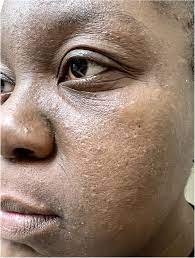Rosacea on black skin can be more challenging to recognize due to the typical redness being less visible, but it’s important to be aware of other symptoms like burning, stinging, or dry-looking skin. Post-inflammatory hyperpigmentation (PIH), or dark spots, can also obscure the underlying rosacea.

Symptoms of Rosacea on Black Skin:
- Burning or stinging: This can be a significant indicator, especially when applying skin care products.
- · Swelling or thickening of the skin: Noticeable on the nose, cheeks, chin, or forehead.
- · Dry, dusky brown patches or discoloration: These can be harder to see as redness.
- · Acne-like breakouts that don’t respond to typical acne treatment: These may be a sign of rosacea.
- · Yellowish-brown, hard bumps around the mouth and eyes: These can be more visible than redness.
- · Increased sensitivity to products or heat: This can be a key symptom.
- · Flushing and blushing: While less obvious, these can still occur.
Misdiagnosis and Importance of Early Treatment:
- Rosacea can be easily misdiagnosed as acne, seborrheic dermatitis, or lupus in darker skin tones.
- · Early diagnosis and treatment are crucial, as rosacea can lead to post-inflammatory hyperpigmentation (PIH).
Dermatologists can help manage rosacea and prevent its progressio
